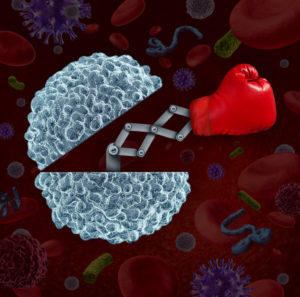
Immunodeficiency and Other Immune Disorders
Our immune system is primarily comprised of white blood cells. These cells make specialized proteins and other chemical substances which help the immune system work properly. The most important function of the immune system is protecting and defending us against “foreign” invaders like viruses, bacteria, fungi, and parasites. When parts of the immune system are missing or not functioning properly, we become susceptible to frequent and/or unusual infections. However, if the immune system overreacts, the body attacks and damages its own tissues. This condition is known as “autoimmunity” since the body is reacting against one’s “self” (instead of “foreign” invaders). This “autoimmune” reaction can lead to one of many autoimmune diseases or disorders which will be discussed later.
IMMUNODEFICIENCY:
Two types of immunodeficiency states are commonly recognized.
- Primary: Caused by hereditary or genetic defects manifesting most commonly in childhood or early adulthood.
- Secondary: Caused by environmental factors which compromise the immune system like HIV infection, immunosuppressive therapy (corticosteroids, chemotherapy, radiation, etc. typically used to treat cancer and organ transplants), malnutrition, etc.
The resulting infections can involve the skin, sinuses, throat, ears, lungs, brain and/or spinal cord, gastrointestinal or urinary tracts.
There are many primary immunodeficiency diseases that have been identified with the great majority of them being very rare. The names of some of these include:
- Selective IgA deficiency
- Common variable immunodeficiency
- Severe combined immunodeficiency (SCID)
- X-linked agammaglobulinemia (Bruton’s agammaglobulinemia)
- DiGeorge syndrome (22q11.2 deletion syndrome)
- Chronic granulomatous disease
- Chédiak-Higashi syndrome
- Hyper IgM syndrome
- Wiscott-Aldrich syndrome
- Ataxia telangiectasia
- X-linked proliferative syndrome
- Chronic mucocutaneous candidiasis
- Cyclic neutropenia
- Leukocyte adhesion deficiency
- Complement deficiencies
Immunodeficiency should be suspected when infections are:
- Severe – Requires hospitalization and/or intravenous antibiotics
- Persistent – Will not completely clear up or clears very slowly
- Unusual – Caused by an uncommon organism
- Recurrent – Continues to keep coming back frequently
Immunodeficiency is commonly associated with:
- Family history of similar illnesses
- Weight loss and/or poor growth
- Swollen lymph nodes and/or an enlarged spleen
- Autoimmune Disorders (Rheumatoid arthritis, Type 1 Diabetes mellitus, Systemic lupus erythematosus, etc.)
The diagnosis is established by:
- Measuring the levels of infection fighting proteins (immunoglobulins) in the blood
- Estimating the numbers of various types of immune system cells
- Evaluating the response to vaccines and immunizations
- DNA tests for genetic defects
Treatments:
- Rapid and aggressive utilization of antibiotics to treat infections
- Avoidance of live vaccines like oral polio, oral typhoid, MMR, BCG, yellow fever, shingles (herpes zoster), intranasal influenza (FluMist), adenovirus, chickenpox (varicella), smallpox, rotavirus, etc.
- Long term prophylactic antibiotic courses to prevent infections
- Replacement of antibodies either through a vein using intravenous immunoglobulin (IVIG) every month or infusion under the skin using subcutaneous immunoglobulin (SCIg) every week
- Growth factors to stimulate production of specific white blood cells
- Stem cell transplantation
AUTOIMMUNITY:
Autoimmune diseases occur (as mentioned above) when one’s immune system becomes overactive and causes the body to attack itself instead of the usual foreign invaders such as bacteria, viruses, fungi, and parasites. This results in damage to different organs and tissues of the body which can have serious consequences. There are a variety of autoimmune disorders and some of them include the following:
- Rheumatoid arthritis
- Type 1 Diabetes mellitus
- Systemic lupus erythematosus (Lupus)
- Sjögren’s syndrome
- Scleroderma
- Graves’ disease
- Hashimoto’s thyroiditis
- Ankylosing spondylitis
- Guillain-Barré syndrome
- Churg-Strauss syndrome
- Reiter’s syndrome
- Takayasu’s arteritis
- Temporal arteritis
- Inflammatory bowel disease (i.e., Ulcerative colitis, Crohn’s disease)
- Multiple sclerosis
- Myasthenia gravis
- Relapsing polychondritis
- Psoriasis
- Polymyositis
- Alopecia areata
- Antiphospholipid syndrome
- Mixed connective tissue disease
- Polyarteritis nodosa
- Primary biliary cirrhosis
- Vasculitis
- Addison’s disease
- Celiac disease
- Dermatomyositis
- Pernicious anemia
- Wegener’s granulomatosis
The symptoms, diagnosis, and treatment of autoimmune diseases depend on the organ or body tissue that it is affecting. Common generalized symptoms include joint pains, muscle aches, fevers, fatigue, and/or rashes. The diagnosis always involves a complete history and physical examination and various blood and urine tests usually are performed. X-rays are frequently done depending on the patient’s complaints and findings on physical examination. The treatment usually involves reduction in symptoms, immunosuppression (reducing the activity of the immune system) while still enabling the body to fight disease. It may be necessary to replace certain hormones and/or vitamins depending on the condition. Medications to control pain are often necessary.
The board certified allergists at Black & Kletz Allergy are trained and experienced in treating immunodeficiency and other immune disorders and are ready to answer your questions and address your concerns. We have been diagnosing and treating these disorders in the Washington, DC, Northern, VA, and Maryland metropolitan area for over 5 decades. We have 3 convenient locations in Washington, DC, McLean, VA (Tysons Corner, VA), and Manassas, VA with on-site parking at each location. Our Washington, DC and McLean, VA locations are also accessible by the Metro. If you have any of the above symptoms or are concerned about your immune system, please call us to schedule an appointment or alternatively, you may click Request an Appointment and we will answer you within 24 hours of the next business day.
